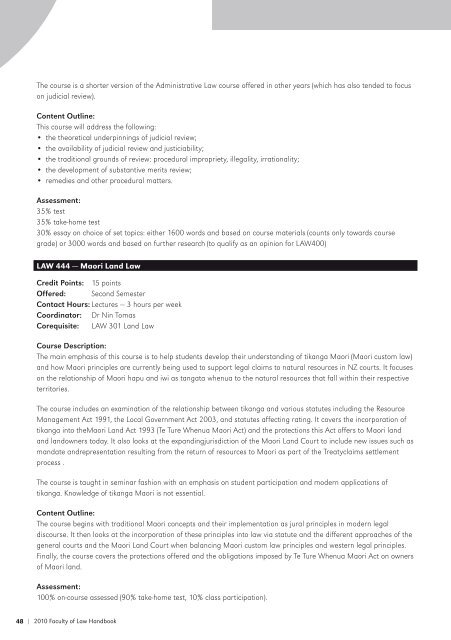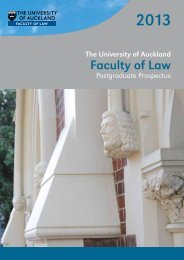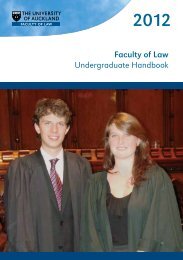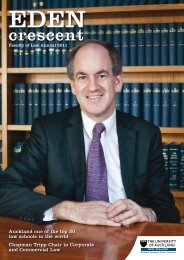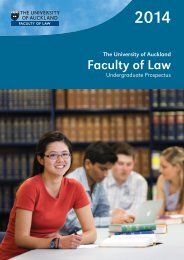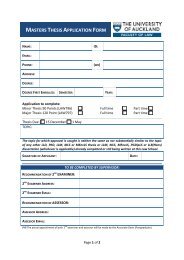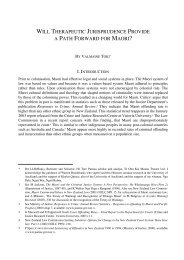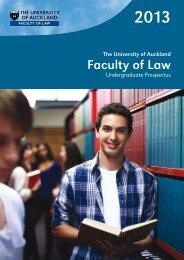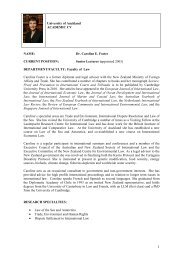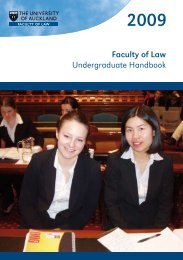Faculty of Law Undergraduate Handbook - Faculty of Law - The ...
Faculty of Law Undergraduate Handbook - Faculty of Law - The ...
Faculty of Law Undergraduate Handbook - Faculty of Law - The ...
- No tags were found...
You also want an ePaper? Increase the reach of your titles
YUMPU automatically turns print PDFs into web optimized ePapers that Google loves.
<strong>The</strong> course is a shorter version <strong>of</strong> the Administrative <strong>Law</strong> course <strong>of</strong>fered in other years (which has also tended to focuson judicial review).Content Outline:This course will address the following:• the theoretical underpinnings <strong>of</strong> judicial review;• the availability <strong>of</strong> judicial review and justiciability;• the traditional grounds <strong>of</strong> review: procedural impropriety, illegality, irrationality;• the development <strong>of</strong> substantive merits review;• remedies and other procedural matters.Assessment:35% test35% take-home test30% essay on choice <strong>of</strong> set topics: either 1600 words and based on course materials (counts only towards coursegrade) or 3000 words and based on further research (to qualify as an opinion for LAW400)LAW 444 — Maori Land <strong>Law</strong>Credit Points: 15 pointsOffered: Second SemesterContact Hours: Lectures — 3 hours per weekCoordinator: Dr Nin TomasCorequisite: LAW 301 Land <strong>Law</strong>Course Description:<strong>The</strong> main emphasis <strong>of</strong> this course is to help students develop their understanding <strong>of</strong> tikanga Maori (Maori custom law)and how Maori principles are currently being used to support legal claims to natural resources in NZ courts. It focuseson the relationship <strong>of</strong> Maori hapu and iwi as tangata whenua to the natural resources that fall within their respectiveterritories.<strong>The</strong> course includes an examination <strong>of</strong> the relationship between tikanga and various statutes including the ResourceManagement Act 1991, the Local Government Act 2003, and statutes affecting rating. It covers the incorporation <strong>of</strong>tikanga into theMaori Land Act 1993 (Te Ture Whenua Maori Act) and the protections this Act <strong>of</strong>fers to Maori landand landowners today. It also looks at the expandingjurisdiction <strong>of</strong> the Maori Land Court to include new issues such asmandate andrepresentation resulting from the return <strong>of</strong> resources to Maori as part <strong>of</strong> the Treatyclaims settlementprocess .<strong>The</strong> course is taught in seminar fashion with an emphasis on student participation and modern applications <strong>of</strong>tikanga. Knowledge <strong>of</strong> tikanga Maori is not essential.Content Outline:<strong>The</strong> course begins with traditional Maori concepts and their implementation as jural principles in modern legaldiscourse. It then looks at the incorporation <strong>of</strong> these principles into law via statute and the different approaches <strong>of</strong> thegeneral courts and the Maori Land Court when balancing Maori custom law principles and western legal principles.Finally, the course covers the protections <strong>of</strong>fered and the obligations imposed by Te Ture Whenua Maori Act on owners<strong>of</strong> Maori land.Assessment:100% on-course assessed (90% take-home test, 10% class participation).48 | 2010 <strong>Faculty</strong> <strong>of</strong> <strong>Law</strong> <strong>Handbook</strong>


